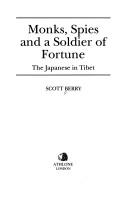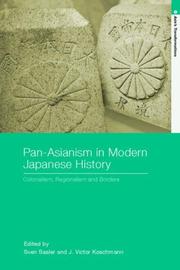| Listing 1 - 10 of 46 | << page >> |
Sort by
|
Book
ISBN: 9784916055606 Year: 2015 Publisher: Tokyo Japan Publishing Industry Foundation for Culture
Abstract | Keywords | Export | Availability | Bookmark
 Loading...
Loading...Choose an application
- Reference Manager
- EndNote
- RefWorks (Direct export to RefWorks)
Book
ISBN: 0300058470 9780300058475 Year: 1994 Publisher: New Haven (Conn.): Yale university press,
Abstract | Keywords | Export | Availability | Bookmark
 Loading...
Loading...Choose an application
- Reference Manager
- EndNote
- RefWorks (Direct export to RefWorks)
Japan --- -Japan --- History --- -Relations --- J4810.80 --- J4810.90 --- J4811 --- J3375 --- Japan: International politics and law -- international relations, policy and security -- Gendai (1926- ), Shōwa period, 20th century --- Japan: International politics and law -- international relations, policy and security -- postwar Shōwa (1945- ), Heisei period (1989- ), contemporary --- Japan: International politics and law -- international relations, policy and security -- world and transregional --- Japan: History -- Kindai, modern -- Taishō period (1912-1926) --- -J4810.80 --- -J3375 --- Relations. --- Relations --- 1868-.... --- Foreign countries --- Japan - History - 1868 --- -Japan - Relations - Foreign countries. --- -Japan - Relations - Foreign countries

ISBN: 048511447X Year: 1995 Publisher: London Athlone
Abstract | Keywords | Export | Availability | Bookmark
 Loading...
Loading...Choose an application
- Reference Manager
- EndNote
- RefWorks (Direct export to RefWorks)
J4812.33 --- J4810.80 --- 815 Geschiedenis --- 845 Religie --- 860 (Vredes)cultuur --- 883.2 Oost-Azië --- Japan: International politics and law -- international relations, policy and security -- Asia -- Tibet --- Japan: International politics and law -- international relations, policy and security -- Gendai (1926- ), Shōwa period, 20th century

ISBN: 9780415372169 9780415372152 041537216X 0415372151 9780203965467 9781134193752 9781134193790 9781134193806 Year: 2007 Publisher: New York (N.Y.) : Routledge,
Abstract | Keywords | Export | Availability | Bookmark
 Loading...
Loading...Choose an application
- Reference Manager
- EndNote
- RefWorks (Direct export to RefWorks)
Regionalism --- J4812 --- J3374 --- J4810.80 --- J4000.80 --- Japan: International politics and law -- international relations, policy and security -- Asia --- Japan: History -- Kindai, modern -- Meiji period (1868-1912) -- imperial expansion --- Japan: International politics and law -- international relations, policy and security -- Gendai (1926- ), Shōwa period, 20th century --- Japan: Social history, history of civilization -- Gendai (1926- ), Shōwa period, 20th century --- East Asia --- Japan --- Relations --- Foreign relations
Book
ISBN: 1282494066 9786612494062 0739132695 9780739132692 9780739126752 073912675X 9780739126769 0739126768 9780739135198 0739135198 9780739135181 073913518X 9780739135204 0739135201 9781282494060 6612494069 Year: 2009 Publisher: Lanham : Lexington Books,
Abstract | Keywords | Export | Availability | Bookmark
 Loading...
Loading...Choose an application
- Reference Manager
- EndNote
- RefWorks (Direct export to RefWorks)
Accessing previously unpublished archival materials, Japan in the World examines the life and diplomatic work of Shidehara Kijuro (1872-1951), situating Shidehara within the context of twentieth century statecraft and international politics. While it was an age of devastating total wars that took a vast toll of civilian lives, the politics and diplomatic history between 1899 and 1949 also saw the light of new developments in international and constitutional law to curtail state sovereignty and reach a peaceful order of international affairs. Japan in the World is an essential resource for unde
Prime ministers --- Diplomats --- Pacifism --- Peace --- Sociology, Military --- Evil, Non-resistance to --- Nonviolence --- History --- Shidehara, Kijūrō, --- 幣原喜重郎, --- Japan --- Foreign relations --- J4180.70 --- J4180.80 --- J4810.70 --- J4810.80 --- Japan: International politics and law -- international relations, policy and security -- Kindai (1850s- ), bakumatsu, Meiji, Taishō --- Japan: International politics and law -- international relations, policy and security -- Gendai (1926- ), Shōwa period, 20th century --- 幣原喜重郎
Book
ISBN: 4562013400 4562014458 4562015942 4562026707 Year: 1983
Abstract | Keywords | Export | Availability | Bookmark
 Loading...
Loading...Choose an application
- Reference Manager
- EndNote
- RefWorks (Direct export to RefWorks)
J4810.80 --- J4810.90 --- Japan: International politics and law -- international relations, policy and security -- Gendai (1926- ), Shōwa period, 20th century --- Japan: International politics and law -- international relations, policy and security -- postwar Shōwa (1945- ), Heisei period (1989- ), contemporary --- Nihon --- Gaikokukankei --- Rekishi --- Shōwajidai.
Book
ISBN: 9788961872164 Year: 2010 Publisher: [Seoul] Northeast Asian History Foundation
Abstract | Keywords | Export | Availability | Bookmark
 Loading...
Loading...Choose an application
- Reference Manager
- EndNote
- RefWorks (Direct export to RefWorks)
En coréen
K9540.60 --- K9551.11 --- K9551.14 --- S09/0411 --- J4812.12 --- J4810.80 --- Korea: International politics, law and relations -- history -- modern period (1860s-[1945]), 20th century general --- Korea: International politics, law and relations -- Asia -- Japan --- Korea: International politics, law and relations -- Asia -- China --- China: Foreign relations and world politics--China and Korea --- Japan: International politics and law -- international relations, policy and security -- Asia -- Korea (South) --- Japan: International politics and law -- international relations, policy and security -- Gendai (1926- ), Shōwa period, 20th century
Book
ISBN: 9781442612341 9781442643864 1442643862 1442612347 Year: 2013 Publisher: Toronto : University of Toronto Press,
Abstract | Keywords | Export | Availability | Bookmark
 Loading...
Loading...Choose an application
- Reference Manager
- EndNote
- RefWorks (Direct export to RefWorks)
"The 1930s was a dark period in international affairs. The Great Depression affected the economic and social circumstances of the world's major powers, contributing to armed conflicts such as the Spanish Civil War and the Second World War. This volume focuses exclusively on Japan, which witnessed a flurry of progressive activities in this period, activities which served both domestic and international society during the "tumultuous decade." Featuring an interdisciplinary and international group of scholars, Tumultuous Decade examines Japanese domestic and foreign affairs between 1931 and 1941. It looks at Japan in the context of changing approaches to global governance, the rise of the League of Nations, and attempts to understand the Japanese worldview as it stood in the 1930s, a crucial period for Japan and the wider world. The editors argue that, like many other emerging powers at the time, Japan experienced a national identity crisis during this period and that this crisis is what ultimately precipitated Japan's role in the Second World War as well as the global order that took shape in its aftermath."--Publisher's website.
National characteristics, Japanese. --- Japonais --- Japan --- Japon --- Foreign relations --- Politics and government --- Social conditions --- Economic conditions --- Relations extérieures --- Politique et gouvernement --- Conditions sociales --- Conditions économiques --- National characteristics, Japanese --- Japanese national characteristics --- J4810.80 --- J4000.80 --- J4600.80 --- Japan: International politics and law -- international relations, policy and security -- Gendai (1926- ), Shōwa period, 20th century --- Japan: Social history, history of civilization -- Gendai (1926- ), Shōwa period, 20th century --- Japan: Politics and law -- history -- Gendai (1926- ), Shōwa period, 20th century
Book
ISBN: 9784866580739 4866580739 Year: 2020 Publisher: Tokyo, Japan : Published by Japan Publishing Industry Foundation for Culture (JPIC),
Abstract | Keywords | Export | Availability | Bookmark
 Loading...
Loading...Choose an application
- Reference Manager
- EndNote
- RefWorks (Direct export to RefWorks)
"The Constitution of Japan is often described as a pacifist constitution for its Article 9 renouncing war and foreswearing war potential. Although this is usually attributed to starry-eyed idealists and steely-eyed realists in the occupation, both of which wanted to ensure Japan did not again challenge America's position, there is also a cast to be made for crediting Shidehara Kijūrō (1872-1951). Indeed, the case becomes even stronger if we think of the Constitution not so much as pacifist but more as internationalist--as evidenced in the Preamble's trusting in the justice and faith of the peace-loving peoples of the world and its belief that no nation is responsible to itself alone. For it was Shidehara who was the ultimate internationalist. Born to a middle-class family four years after the Meiji Restoration, he went to Tokyo Imperial University and from there to the civil service, ending up at the Ministry of Foreign Affairs. From there, history took him to a number of foreign capitals and historic international conferences on his way to the foreign ministership and after he became foreign minister. Serving as foreign minister under a succession of prime ministers, he developed and staunchly promoted what came to be called Shidehara diplomacy--a foreign policy stance of not intervening in China, respecting the Anglo-Japanese alliance, and adhering to what were put forward as universal values. Yet despite his steadfast championship, this internationalist stance was weakened by widespread discrimination against Japanese (e.g., in America's immigration laws) and fatally wounded by the Kwangtung Army's rogue aggression in China. He resigned as foreign minister in 1931, while retaining his seat in the House of Peers, and was tapped by the occupation to be Japan's first postwar prime minister, putting him in a position to influence the Constitution's drafting. Shidehara's was a principled life engagingly recounted in this informative biography by one of Japan's foremost diplomat-turned-historians."--Dust jacket.
J4810.80 --- J4600.80 --- J4641 --- J2284.80 --- Japan: International politics and law -- international relations, policy and security -- Gendai (1926- ), Shōwa period, 20th century --- Japan: Politics and law -- history -- Gendai (1926- ), Shōwa period, 20th century --- Japan: Politics and law -- central government -- cabinet --- Japan: Genealogy and biography -- biographies -- Gendai, modern (1926- ), Shōwa, 20th century --- Diplomats --- Foreign ministers --- Shidehara, Kijūrō, --- Japan --- Foreign relations --- Diplomatic relations. --- Diplomats. --- Foreign ministers. --- Nihon-Rekishi-Kindai. --- Shidehara, Kijūrō, --- 1868-1945 --- Japan.
Book
ISBN: 9781400878420 9780691056289 0691651809 140087842X 9780691625348 9780691651804 0691056285 0691625344 Year: 2015 Publisher: Princeton, NJ
Abstract | Keywords | Export | Availability | Bookmark
 Loading...
Loading...Choose an application
- Reference Manager
- EndNote
- RefWorks (Direct export to RefWorks)
Analyzes the change in national attitudes after the outbreak of World War II, the San Francisco conference and treaty, and the effect of settlement on the security of the West.Originally published in 1963.The Princeton Legacy Library uses the latest print-on-demand technology to again make available previously out-of-print books from the distinguished backlist of Princeton University Press. These editions preserve the original texts of these important books while presenting them in durable paperback and hardcover editions. The goal of the Princeton Legacy Library is to vastly increase access to the rich scholarly heritage found in the thousands of books published by Princeton University Press since its founding in 1905.
World War, 1939-1945 --- J4810.80 --- J4815.11 --- J3389 --- J3388 --- Peace --- Japan: International politics and law -- international relations, policy and security -- Gendai (1926- ), Shōwa period, 20th century --- Japan: International politics and law -- international relations, policy and security -- North America -- United States --- Japan: History -- Gendai, modern -- Shōwa period -- World War II -- occupation period (1945-1952) --- Japan: History -- Gendai, modern -- Shōwa period -- World War II -- Pacific war (1941-1945) --- United States --- Foreign relations administration.
| Listing 1 - 10 of 46 | << page >> |
Sort by
|

 Search
Search Feedback
Feedback About UniCat
About UniCat  Help
Help News
News